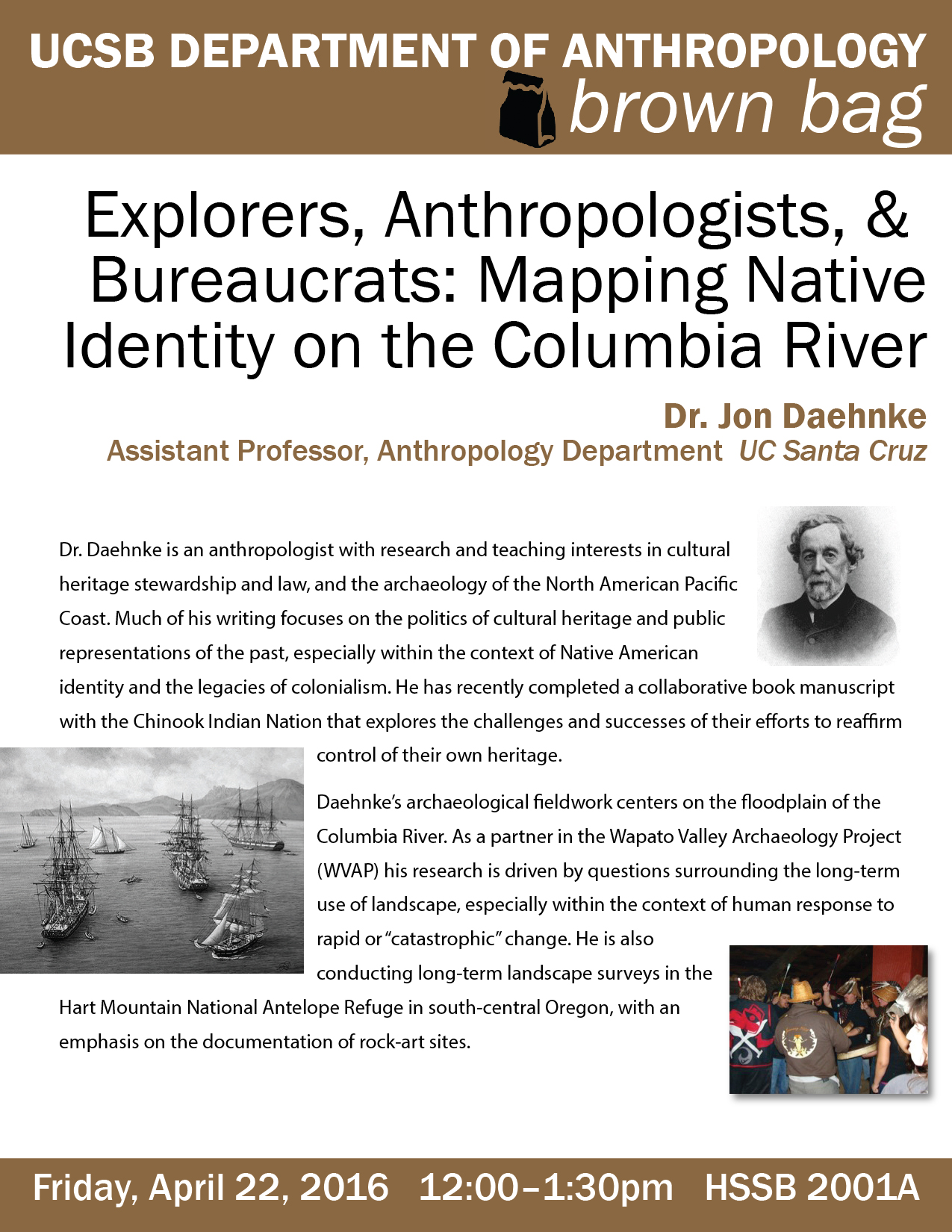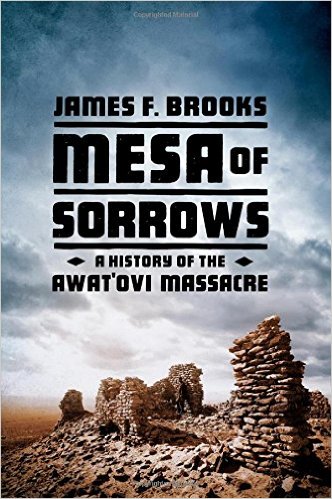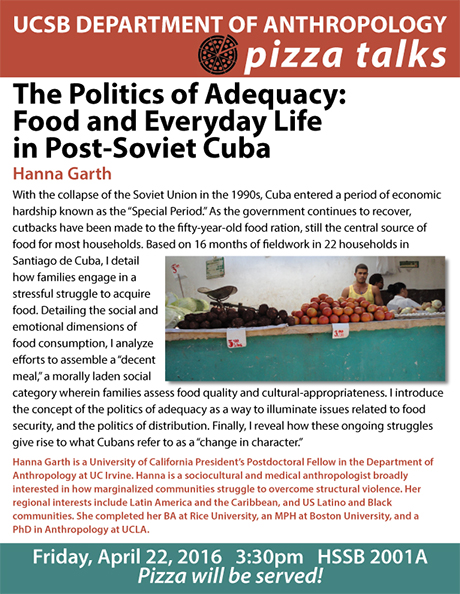Featured Events
All News

Brown Bag: Explorers, Anthropologists, and Bureaucrats: Mapping Native Identity on the Columbia River
Dr. Jon Daehnke, Assistant Professor, Anthropology Department, University of California, Santa Cruz
Spring 2016 Brown Bag
Dr. Daehnke is an anthropologist with research and teaching interests in cultural heritage stewardship and law, and the archaeology of the North American Pacific Coast. Much of his writing focuses on the politics of cultural heritage and public representations of the past, especially within the context of Native American identity and the legacies of colonialism. He has recently completed a collaborative book manuscript with the Chinook Indian Nation that explores the challenges and successes of their efforts to reaffirm control of their own heritage.
Daehnke’s archaeological fieldwork centers on the floodplain of the Columbia River. As a partner in the Wapato Valley Archaeology Project (WVAP) his research is driven by questions surrounding the long-term use of landscape, especially within the context of human response to rapid or "catastrophic" change. He is also conducting long-term landscape surveys in the Hart Mountain National Antelope Refuge in south-central Oregon, with an emphasis on the documentation of rock-art sites.

Grad Student Mattew Biwer receives Wenner Gren Award
The Wenner-Gren Foundation has three major goals – to support significant and innovative anthropological research into humanity's biological and cultural origins, development and variation, to foster the creation of an international community of research scholars in anthropology, and to provide leadership at the forefronts of the discipline. Matt's award will help fund his dissertation. Congratulations!
Continue Reading Grad Student Mattew Biwer receives Wenner Gren Award
James F. Brooks' book "Mesa of Sorrows: A History of the Awat'ovi Massacre" reviewed in Slate
"James Brooks’ writing has a winningly mournful streak of lyricism in Mesa of Sorrows." Read the full review in Slate
From Amazon.com:
A scrupulously researched investigation of the mysterious massacre of Hopi Indians at Awat'ovi, and the event's echo through American history.
Continue Reading James F. Brooks' book "Mesa of Sorrows: A History of the Awat'ovi Massacre" reviewed in Slate
Slavery, Captivity, and the Meaning of Freedom: Conference
jbrooks@history.ucsb.edu
jdelombard@english.ucsb.edu
rmaclean@classics.ucsb.edu
emphasize the slave’s status as property, the concept of “social death” remains highly influential, and yet seems not fully able to encompass advances in the scholarship on smaller-scale forms of human bondage. Some students of slavery prefer to explore the
rubric of “captivity,” which places slaves within the broader class of persons who have been relocated against their will into a new social context, from the ancient Mediterranean to the modern carceral state (Brooks 2002; Cameron 2011). Even the distinction between “slave societies” and “societies with slaves” is subject to fierce contention (Cameron and Lenski, forthcoming). This RFG’s initial and perhaps most invigorating debate will address how to delineate our common object of study, a conversation which happens most effectively across disciplinary lines. Even as we grapple with terms like “slave,” “captive,” “free,” and “unfree,” scholars working on these topics share a core set of questions. The enforced exploitation of labor informs economic and technological history. The master-slave relationship, in its seemingly infinite iterations, epitomizes the negotiation of power in situations of extreme imbalance. Representations of slavery in visual art and text illuminate cultural responses to subjugation and violence. And the ways in which enslaved persons survive or escape slavery, form networks, practice religion, bury their dead, and otherwise fashion their lives problematize the politics of groups in captivity (Brown 2009). Studying modes of accommodation and resistance reveals, in turn, the ideological forces that lead us to perceive the experience of slavery as knowable or invisible, tragic or triumphant. After the abolition or decline of massive slave systems such as those found in the Roman empire and the Americas, the legacies of slavery have proven remarkablytenacious, as have forms of captivity and exploitation that closely resemble legal enslavement. New research linking the ancient and modern worlds includes, for example, incisive studies of the reception of classical Greek slavery (duBois 2003) and of African American and Caribbean writers’ engagement with the Classical tradition (Rankine 2006; Greenwood 2010; Tatum and Cook 2010). In recent years, a renewed emphasis on relationships between capitalism and slavery has produced prize-winning works at the regional, national, and global levels of analysis (Johnson, 1999, 2013; Baptist 2014; Beckert 2014). These force us to confront the persistence of slavery in the 21st century,and to wonder if, indeed, it is intrinsic to human affairs (Bales 1999; Bales and Soodalter 2009).
Grad Student Jenna Santy receives NSF Dissertation Improvement Grant Award
Jenna Santy has been awarded a National Science Foundation dissertation improvement grant to investigate how environmental change affected social organization and community formation during the pre-Columbian occupation of Owens Valley in eastern California. Congratulations, Jenna!
Continue Reading Grad Student Jenna Santy receives NSF Dissertation Improvement Grant AwardAnthropology's First Grad Slam Winners!
Congratulations to Kaitlin Brown (1st Place), Amy Anderson (2nd Place) and Sarah Kerchusky (3rd Place)!
Continue Reading Anthropology's First Grad Slam Winners!
